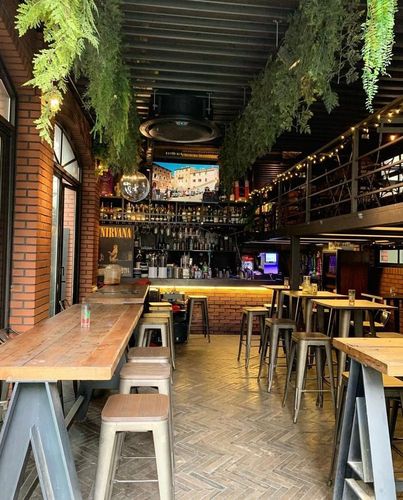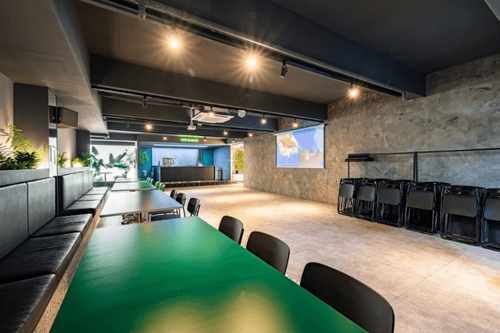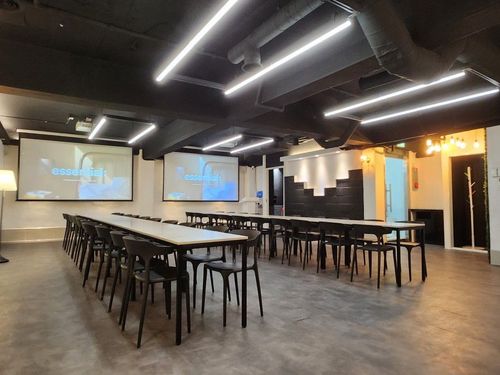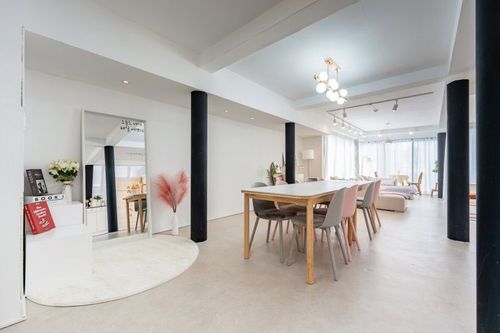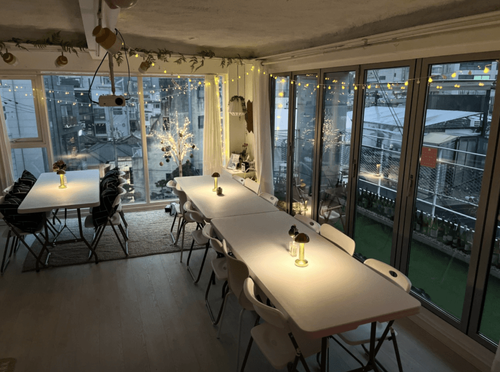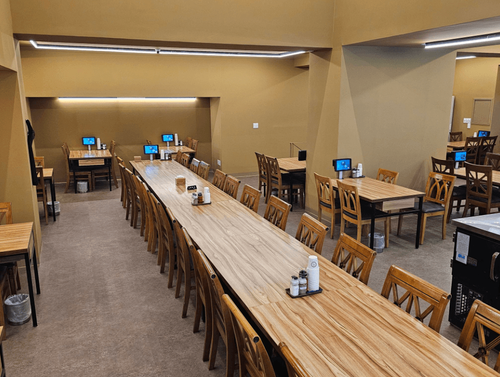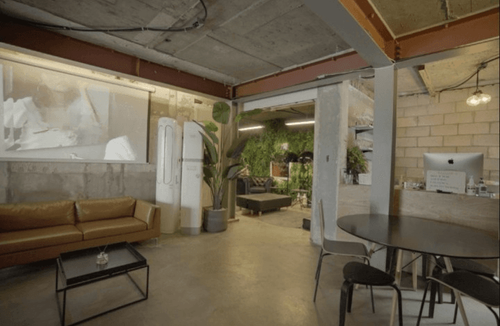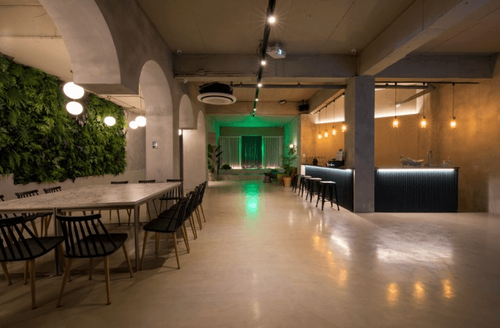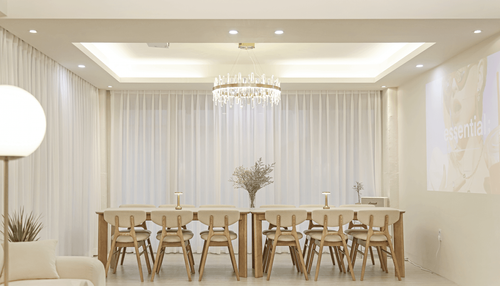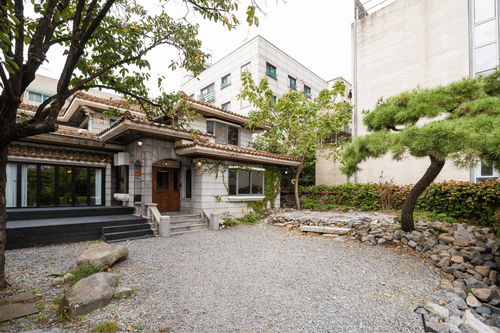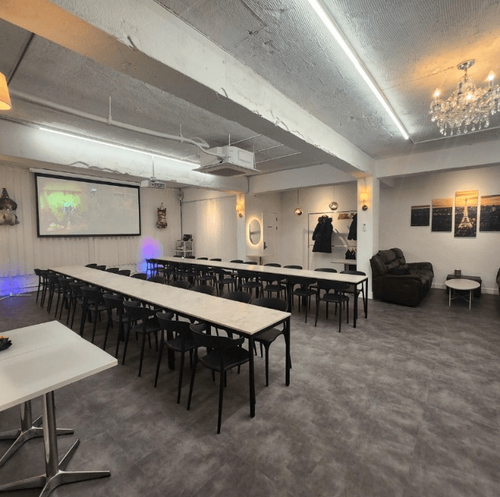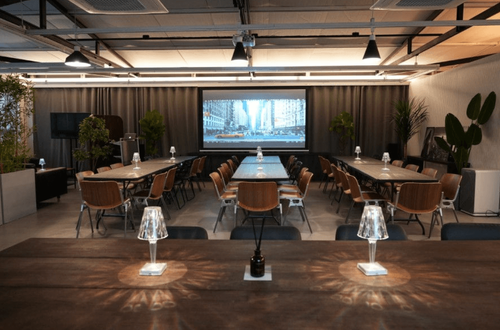Hire After-Work Venues in Seoul

Popular Afterwork Venues in Seoul
Find unique afterwork spaces in Seoul
See AllContemporary Chic Venue With Black Interior and Floor-to-Ceiling Windows for Intimate Events
Looking for a venue that blends sleek modernity with stunning river views? Look no further! This Bauhaus-inspired contemporary space in Seoul, featuring chic black interiors and floor-to-ceiling windows with a panoramic view of the Han River, is perfect for... Show More
Modern Venue With Blend of Elegance and History for Corporate Events With Stunning Palace Views
Located amidst Seoul's rich tapestry of history and modernity, discover a venue where classical Korean charm meets contemporary sophistication. Imagine hosting your next event in a space adorned with brown and off-white hues, subtly infused with echoes of... Show More
Chic Industrial Cafe With an Outdoor Terrace for Happy Hour Events
This venue seamlessly combines industrial chic with modern urban design, offering a unique and vibrant atmosphere for any type of event. The open-air terrace is the highlight, bathed in bold red neon lighting that creates an electric yet inviting ambience.... Show More
Modern and Spacious Venue With Tropical Vibes
Planning an unforgettable event in Seoul? This chic, modern venue in Hongdae is the perfect choice! Known for its trendy and vibrant atmosphere, it features modern decor and versatile spaces, ideal for everything from corporate events to cocktail mixers.Locate... Show More
Classy Minimalistic Venue With Chic Interiors
Step into this amazing venue where versatility meets chic sophistication. Situated in Seoul's vibrant landscape, this unique space is perfect for hosting a diverse range of events, from swanky cocktail parties to dynamic workshops and everything in between.... Show More
Versatile Event Space With Vibrant Interiors for Corporate Events
Step into a venue where vibrant hues and lush greenery converge in the heart of Seoul's bustling scene. This unique venue boasts an exquisite blend of bright, bold colors and architectural elements adorned with green leaves, creating an atmosphere that... Show More
Chic Venue With Tropical Modern Vibes
Step into a tropical haven with a modern twist at this stunning Seoul venue. Perfect for everything from high-energy galas to intimate dinners, its off-white, breezy ambiance will transport your guests to a chic retreat. The venue’s spacious layout features... Show More
Modern Loft With Pink Accents and Black Accents for Stylish Events
Are you seeking a venue that seamlessly blends modern elegance with natural allure in bustling Seoul? Imagine hosting your next event in a space that offers both sophistication and a touch of outdoor serenity. This modern chic venue in Seoul not only meets... Show More
Eclectic Venue with Artistic Flair for Memorable Gatherings
Discover Seoul's premier venue for versatile events with unique creative touches, ideal for cocktail parties, small parties, and more. Nestled near Sangsu Station, it offers a vibrant and energetic setting that enhances any gathering. Step into a world of... Show More
Neon Arcade Hall for Team Celebrations and Launches
This neon arcade hall delivers a high-energy setting for parties, brand activations, and team celebrations. Electric lighting, game consoles, and futuristic visuals set the tone for immersive, play-driven experiences.The open-plan layout includes modular café... Show More
Warm Wooden Interiors in Myeongdong Perfect for Events and Gatherings
Planning an unforgettable event in Seoul? Look no further than Myeongdong's largest multipurpose space rental, where elegance meets versatility. This spacious venue, adorned with warm brown interiors and complemented by woody chairs and tables, creates a... Show More
Chic Urban Industrial Event Venue With Modern Design
Looking to add a dash of industrial chic to your next event? Look no further than this Seoul venue! With their edgy, raw interiors featuring exposed brick and walls, black beams, and sleek concrete floors, these spaces ooze urban cool. The minimalist design... Show More
Stylish and Versatile Event Space Featuring Modern Amenities
Welcome to your premier venue in Seoul for all your event needs! Whether you're planning a chic cocktail soirée, a productive seminar, or an intimate workshop, this versatile space is your go-to destination. It boasts top-notch amenities and an atmosphere... Show More
Charming Minimalist Venue With Greenery for Intimate Corporate Gatherings
Step into a world where modern minimalist design meets lush greenery at this elegant venue. Located in the heart of Gwanak-gu, this event space boasts an inviting, contemporary aesthetic characterised by its sleek concrete arches and vibrant vertical gardens.... Show More
Sky Garden Rooftop Atrium With Bonsai Clusters and Skyline Views for Wellness Events
Elevated on the 14th floor, this rooftop venue fuses the serenity of a bonsai garden with rustic outdoor charm—an unexpected urban oasis perched between two minimalist light-grey buildings. Rooted in Japanese Zen landscaping and urban contemporary architecture... Show More
Warm and Stylish Event Space With Spacious Wood Terrace
Looking for a spot that’s got that cosy yet chic vibe? Look no further! Nestled right on Hapjeong Cafe Street, this studio and party room offers a warm atmosphere and a stunning wood terrace – perfect for making those special moments unforgettable. Step into... Show More
Sculptural Indoor-Outdoor Café for Creative Gatherings
This sculptural indoor-outdoor café blends architectural form with open, flexible space for creative gatherings, informal talks, or social events. Inside, a striking wooden ceiling grid stretches over café tables and a long concrete bar, while a separate... Show More
Traditional Stone-Facade Venue With Lush Landscaping for Celebrations and Events
Looking for a venue that combines natural beauty with modern elegance? This light beige, multi-storey building with a reddish-brown tiled roof is a dream come true for any event. The stone-like façade, complemented by large windows and a striking dark wooden... Show More
Versatile Space Venue With Industrial Charm
Experience an exceptional event venue in the heart of Seoul, where industrial charm harmonizes seamlessly with modern design elements. Perfectly suited for corporate events, workshops, and celebrations alike.This versatile venue promises to captivate your... Show More
Industrial Conference Hub With Exposed Pipes and Brick Detail for Innovation Workshops
Defined by its industrial minimalist architecture, this modern event space exudes quiet sophistication with its high ceilings, exposed beams, and floor-to-ceiling windows that flood the room with natural light. The space balances functionality and design... Show More
A Guide to Hosting an Afterwork Event in Seoul
From the infectious energy of a late-night karaoke session with friends to the thrill of exploring bustling night markets and the pure joy of dancing to the latest K-pop hits, South Koreans know how to celebrate life with flair.
They find joy in everything from the calm of hiking in beautiful mountains to the communal relaxation of a jjimjilbang (traditional sauna). It's not just about entertainment; it's about creating moments of connection and happiness, turning everyday experiences into something special. For Koreans, having fun is a joyful reflection of their culture, community, and the simple pleasures of life.
That's why an after-work event in Seoul is a unique experience. Forget the usual dinner and drinks (although the city does have plenty of places for those). Seoul has a lot going on, so you can make any evening special. From team-building at a lively karaoke bar to exploring the city's night markets, and sampling the delicious street food, Seoul makes after-work parties truly special.
If you're looking for something more laid-back, why not check out one of Seoul's famous jjimjilbangs? Your group can unwind in the hot baths and saunas, and you can even catch a movie together in the common areas. Fancy mixing work with a bit of culture? Seoul's art galleries and exhibitions are the perfect place to chat and get inspired after dark. From rooftop bars with amazing city views to quirky-themed cafes, after-work parties in Seoul are anything but ordinary.
So, are you ready to dive into the exciting world of after-work events in Seoul? Let’s go!
1) A Look at the Types of After-Work Venues in Seoul
While the city has plenty of activities, Seoul is also quite flexible. If an after-work idea needs a venue, South Korea’s capital gives you plenty of options for that as well!
1. Rooftop bars: Seoul's skyline is pretty unique, and there's no better way to enjoy it than from a rooftop bar. These rooftop bars are the perfect place to enjoy a cocktail with a great view of the city.
No matter where you are in Seoul, you'll find rooftop bars with a great selection of wines and creative cocktails. The atmosphere is lively, making it a great place to socialise, relax, and enjoy the city lights.
2. Izakayas: If you're in the mood for something more energetic, head to one of Seoul's many izakayas. These Japanese-style pubs are all about good food, great drinks, and a lively atmosphere. You'll find everything from sake and soju to delicious tapas-style dishes perfect for sharing. It's the perfect place to let loose, laugh, and enjoy a casual after-work night out with colleagues.
3. Stylish lounges: For those who appreciate a bit of luxury, Seoul's stylish lounges are the perfect spot for an after-work event. These venues often have cool interiors, nice seating, and a menu of drinks and bites. Whether you're in the mood for a classic cocktail, a glass of fine wine, or just want to unwind in an elegant setting, these lounges offer a great mix of comfort and style.
4. Hanok cafes: For something a little more relaxed, Seoul's hanok cafes offer a unique after-work venue. These traditional Korean houses have been transformed into charming cafes where you can enjoy a hot tea or a glass of wine in a tranquil, historic setting. The peaceful atmosphere and beautiful architecture make these places perfect for unwinding or chatting quietly with friends or colleagues.
5. Quirky-themed bars: Seoul is known for its creativity, which is evident in its whimsical bars. From retro gaming bars where you can challenge your colleagues to a round of Street Fighter, to speakeasy-style venues hidden behind unmarked doors, these spots offer a fun twist on the usual after-work venues. They're ideal for those who like to mix things up and experience something a little out of the ordinary.
2) Explore the Best Neighbourhoods in Seoul for an After-Work Party
We’re not going to lie, you can probably host an after-work event anywhere in Seoul and it will be a stellar experience — the city is full of great spaces and neighbourhoods that can cater to any taste. But we’re here to simplify your job, so we’ve narrowed down our top neighbourhoods to help you take one step off your planning plate.
1. Itaewon: If your team loves diversity and a mix of cultures, Itaewon is the place to be. Known as Seoul's international district, Itaewon is a melting pot of global cuisine, trendy bars, and a high-energy atmosphere perfect for mingling after a long day at work.
From chic rooftop lounges with stunning city skyline views to cosy pubs serving craft beers from around the world, Itaewon has it all. And with a vibrant nightlife, your after-work event can quickly turn into a fantastic all-nighter.
2. Gangnam: Luxury and sophistication are synonymous with Gangnam. This upscale district is home to some of Seoul's most stylish after-work venues, making it the ideal location for a sophisticated after-work event.
Gangnam has it all, whether you're looking for a cocktail party at a chic rooftop bar or a relaxed gathering in a high-end lounge. The area's reputation for quality dining and entertainment means you'll have plenty of options to impress your guests.
3. Hongdae: For a more relaxed and artsy vibe, Hongdae is the neighbourhood to go to. The area is known for its youthful energy, indie music scene, and creative spaces. Hosting an after-work event in Hongdae means you can tap into the neighbourhood's unique charm, with venues offering everything from quirky themed bars to cafes with live music.
It's the perfect choice if your team enjoys a more casual, creative atmosphere where they can let loose and have fun.
4. Myeongdong: This district is Seoul's bustling shopping mecca, but it's also a fantastic place for an after-work event. Full of trendy cafes, stylish bars, and hidden pubs, Myeongdong offers a variety of options for any type of gathering.
Whether you're planning a casual get-together or a more formal event, Myeongdong's lively streets and vibrant atmosphere make it an exciting choice that's sure to keep the conversation going.
5. Han River: For something a little different, why not hold your event by the Han River? This iconic river runs through the heart of the party. You can enjoy a riverside barbecue, hire a party boat or simply relax at one of the chic riverside cafes as the sun sets over the city. It's the perfect way to unwind and enjoy Seoul's natural beauty while still in the middle of the action.
3) Budgeting in Style for an After-Work Party
When planning an unforgettable after-work event in Seoul, balancing fun and budget is key! But no need to stress —- we've got you covered with a handy guide to managing your expenses. Here's a breakdown of what you can expect to spend on venues.
- Budget-friendly venues: If you're looking to keep things casual and budget-friendly, you can expect to pay around €50 to €80 per hour. These venues provide the basics and are great for informal gatherings or small groups.
- Mid-range venues: For something a little more sophisticated, expect to spend between €80 and €160 per hour. These venues offer a step-up in atmosphere and amenities, ideal for medium-sized events. You'll find trendy bistros, stylish lounges or boutique restaurants in this range.
- Premium venues: For a truly luxurious experience, prices start from €160 and can go up to over €400 per hour. These high-end after-work venues offer exceptional service and elegant surroundings, perfect for high-profile meetings or large celebrations.
Additional Costs to Consider:
- Catering
- Audiovisual Equipment
- Decor and Setup
- Service Charges and Taxes
- Entertainment
- Transportation
4) Get Your Catering Needs Covered With These Top Caterers for After-Work Events
You can’t have an after-work party without food! These top event caterers in Seoul will help your event attendees network over the most delicious catering options.
1. The Four Seasons Hotel, Seoul: For a prestigious after-work event, The Four Seasons Hotel Seoul offers world-class catering services that combine elegance with exceptional quality.
Catering options include a selection of gourmet canapés, sophisticated bites, and a range of fine beverages. Whether you're hosting a high-end networking event or a relaxed social gathering, their experienced team can customise the menu to suit your needs, ensuring a luxurious experience for all guests.
2. Catering by The Kitchen: For after-work events that require a blend of creativity and sophistication, Catering by The Kitchen is the perfect choice. They offer various menus, from gourmet finger foods to elaborate dinners.
Their team works closely with clients to create bespoke menus that reflect the theme and preferences of the event. Ideal for both informal and formal gatherings, their catering ensures quality presentation and flavour, making any after-work event memorable.
3. Hyundai Green Catering: Known for its reliable service and extensive menu options, Hyundai Green Catering offers a variety of Korean and international dishes. Its catering is suitable for after-work events that require a professional touch, including everything from full meals to elegant canapés. Its focus on quality and attention to detail ensures that every aspect of your event is handled with care.
4. Café Mamas: For a casual yet stylish after-work party, Café Mamas is a popular choice. They specialise in fresh, healthy options, including gourmet sandwiches, zesty salads, and delicious pastries. Their catering service is flexible and can be tailored to suit an after-work event's casual, relaxed atmosphere.
With a focus on quality ingredients and creative presentation, Café Mamas offers a refreshing alternative for events emphasising good food in a relaxed setting.
5. Baekje Samgyetang: For an after-work event that offers a true taste of Korean tradition, Baekje Samgyetang is an excellent choice. Known for their specialisation in traditional Korean cuisine, they offer a unique culinary experience with their signature samgyetang, a nutritious ginseng chicken soup.
Their menu also includes other Korean favourites such as pajeon (scallion pancakes) and a variety of banchan (assorted side dishes). These dishes offer a delightful mix of flavours and textures, making them perfect for a lively and engaging after-work gathering where guests can enjoy a true taste of Korean cuisine.
5) Going the Extra Mile for After-Work Events in Seoul
Okay, so we have the typical cocktail party or an after-work dinner and drinks but this is Seoul and if you really want to breathe the Korean spirit into your after-work event. Here are some fun ideas!
- K-pop dance class: For your after-work event, organize a K-pop dance class to get a taste of Korea's pop culture. Hire a local dance instructor to teach guests some of the hottest K-pop moves. It'll get everyone moving and is a great way to bond with colleagues and experience a slice of Seoul's world-famous entertainment scene.
- Host a traditional Korean tea ceremony: Invite a tea master to show participants how to prepare and enjoy Korean tea. This experience is great for unwinding after a busy day and introducing guests to an important aspect of Korean culture.
- Korean street food market: Bring the buzz of Seoul's night markets to your event with a Korean street food market. You can serve up a variety of iconic street foods like tteokbokki, kimchi pancakes, and hotteok. This interactive culinary experience is a great way to satisfy cravings and get a real taste of Seoul's vibrant street food culture.
- Makgeolli and soju tasting: Introduce your guests to Korea’s beloved traditional drinks with a makgeolli and soju tasting station. Offer a selection of makgeolli, a slightly sweet rice wine, and various flavours of soju, Korea’s famous distilled spirit. Pair these with classic Korean snacks like kimchi and jeon for a full-flavoured experience that showcases the richness of Korean beverages.
- Hanbok experience booth: Add a touch of tradition to your event with a hanbok experience booth. Set up a station where guests can try on and take photos of hanboks, the traditional Korean dress. This activity provides a fun and memorable way for attendees to immerse themselves in Korean culture, making it a great conversation starter and a unique addition to your event.
Wrapping Up
We hope this guide has sparked some great ideas for your after-work event in Seoul. Before you kick off the planning, just a quick reminder: if you’re looking to book the perfect venue in the city, our local experts are here to help. They'll ensure you find a venue that suits your needs, so get in touch and let's start this party.

FAQs about Seoul Afterwork Venues
Hiring a translation service could be a smart move if you're hosting an after-work party in Seoul and your guest list includes people from different language backgrounds. While many people in Seoul speak English, an interpreter can ensure everyone feels included, especially during key moments such as speeches or announcements.
They can also help with cultural nuances, making your event smoother and more enjoyable for guests. It also shows that you've thought about every detail, creating an atmosphere where everyone can relax and connect without language barriers.
Most after-work venues close around midnight or 1 AM, although this can vary depending on the city and venue. In bustling urban areas, especially in cities known for their vibrant nightlife, some venues may stay open until 2 AM or later. It's always a good idea to check with the venue beforehand, as opening hours may vary depending on the day of the week or special events.
For an after-work party in Seoul, whether you need a permit to serve alcohol depends on the venue type and the event's nature. If you're holding the party at a licensed venue, such as a bar, restaurant or hotel, the venue will already have the necessary permits to serve alcohol.
However, suppose you're planning to serve alcohol in a private venue, such as a rented room or public area. In that case, you may need to apply for a temporary alcohol licence, especially if you plan to charge for drinks. It's always a good idea to check with the local authorities or venue management in Seoul to make sure you're following the correct regulations.
Incorporating some authentic Korean specialities for your after-work catering in Seoul will add a delightful touch to your event. Consider kimchi, the iconic spicy fermented cabbage that is a staple of Korean cuisine, and bulgogi, a crowd favourite of thinly sliced marinated beef grilled to tender perfection.
Japchae, stir-fried glass noodles mixed with vegetables and sometimes beef or pork, is a slightly sweet and savoury option that guests will love. Don't forget kimbap, Korea's version of sushi rolls, which are stuffed with vegetables, meat, and rice and wrapped in seaweed. These dishes not only showcase the rich flavours of Korean cuisine but also offer a variety of tastes and textures that are sure to impress your guests.
